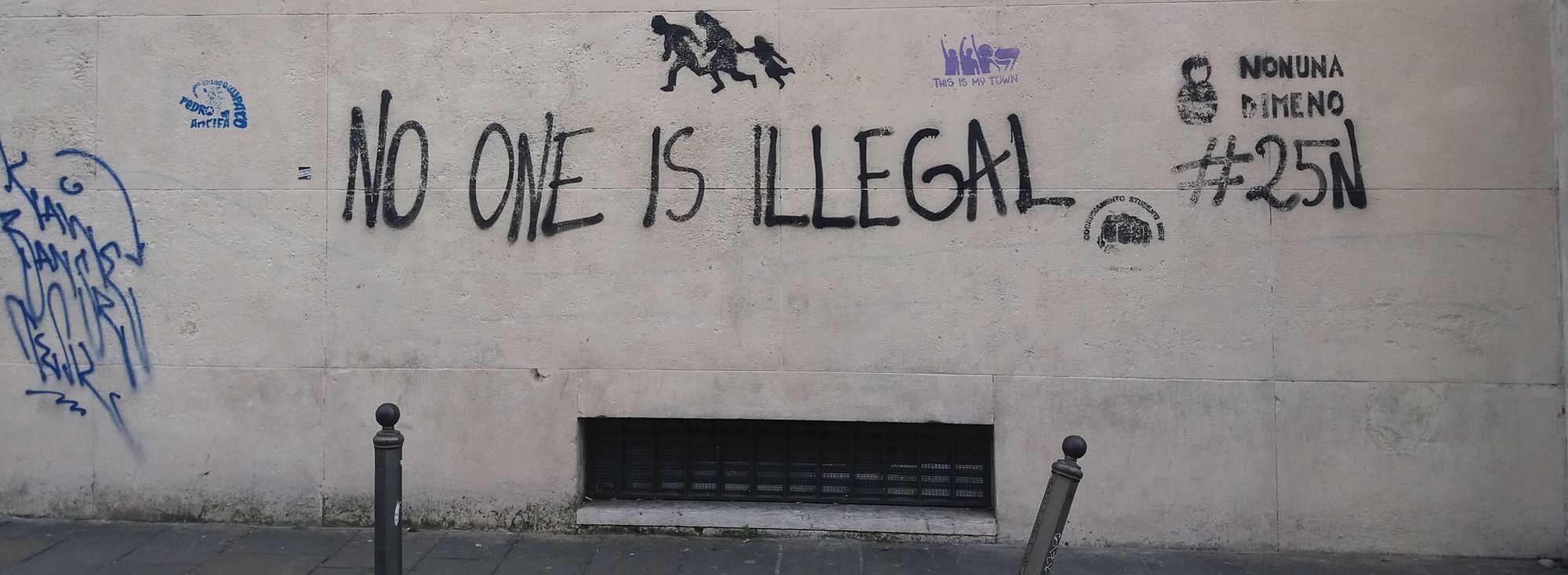Migration, Massage Parlors, and the Right to Work
The concept of the Asian migrant sex worker toiling away in a massage parlor has been a long part of the media's cast of sex work tropes. And while the latest massage parlor-based stories have centered on Florida and its wealthy clientele, the last months have also seen multiple stings in Providence, Rhode Island and Columbus, Ohio, increased regulations in Duluth, Minnesota and Ames, Iowa and ongoing prosecutions of managers in Delaware (with penalties as high as $700,000) and Durham, North Carolina (including felony conspiracy, stemming from prostitution).
And as sex workers try and reclaim many of these narratives of criminalization and policing of the sex trade, raids on massage parlors are often subsumed by larger conversations on sex workers rights or trafficking in persons. In the United States, Asian sex workers are both hyper-visible in conversations about sex work and trafficking, while remaining almost entirely invisible as active participants in these conversations.
In 2017 the issue of police raids of massage parlors was further thrust into public awareness when Yang Song, a migrant worker from China who had been saving to open a business with her brother, died during a workplace police raid. The family is still fighting for justice, including the return of her possessions which were confiscated during the raid.

A Sex Workers Rights Frame?
But in some ways, the conversation on sex workers' rights may be a false framework for understanding the experiences and needs of Asian migrants in massage parlors.
"Sex worker as an identity or sex work as a profession or identifier doesn’t seem to fit a lot of the [Asian/Pacific Islander] migrant or immigrant women." Says Aya Tasaki, Manager of Policy and Advocacy at Womankind, an organization serving the Asian community in New York. "A lot of times there just isn’t such a strong claiming of that identity of being a sex worker, or this idea of anything that could be identified as sex work or trading sex, it almost is an after-thought."
Kate Zen, an organizer with Red Canary, which focuses on workers in massage parlors from the migrant Asian community, says the experience is simply one of the easiest labor opportunities for migrant workers. “[F]or Chinese migrants, it’s one of the avenues that people go into when they come to this country and have no skills, they can go into maybe restaurant work or nannying… [but] it’s hard to come by a good position that pays well.” Working in massage parlors can allow people to follow more money, as workers frequently switch to new workplaces when business is low in one place to a location they've heard is busier.
But not all massage parlor work falls into sexual labor, or the connection is a tenuous one. While some workers in massage parlors may offer extras, it varies from parlor to parlor and worker to worker. “Many parlors do exist just for massage and there are many men who also work in Chinese massage parlors who do not earn as much as women do in these businesses,” says Zen.
"[A] lot of individuals who choose to work in massage parlors and are doing massage work for a day or two, or maybe even months or years before the option of doing sex work comes up within the same space. Very often it is purely an economic decision that they make," notes Tasaki. For many massage parlor workers, theirs is a story of labor rights, not sex worker rights. "It’s not about wanting to be recognized as sex workers... it’s more about [improving] labor conditions... less interaction with law enforcement, and [protection] from immigration stuff. That’s the main language that most of the community is interested in."
Expanding Decrim
Red Canary, though, is looking to tackle these intersections of labor, migration, sex work and racial justice directly. While they are an active member of DecrimNY, a coalition of over thirty New York-based organizations which are fighting to decriminalize sex work in the state, Red Canary has a diverse range of goals.
As Zen notes, “removing the criminal laws on the state level are certainly not the end of the battle.”
Beyond the criminalization of trading sex, all but four states regulate massage therapy (without the upgrades) through costly licensing which can require hours of unpaid work on top of classes. The burden can be insurmountable for newly arrived migrants without thousands in disposable capital and an established foundation, or for whom massage work is not a long-term endeavor. In New York, there is also a morality clause in the licensing provisions, meaning a prostitution arrest could cost you your license.

The Movement of Migration
When considering the issues faced by migrant Asian massage parlor workers, even those in the United States who have a stable documentation status (meaning not undocumented or on an expired visa) exist under multiple layers of criminalization, and live at the nexus of local, state and federal law enforcement. And many of those laws are not part of current conversations on decriminalization.
As terrifying as an arrest can be for someone who is a citizen, non-citizens have the added fear of deportation. Even before someone is convicted of a crime, they may already see immigration-related consequences. For those who have an unstable migration status (they have an expired visa, for example, or came in without documentation), even reporting that they have been victimized and want to report that crime can get them picked up and put into deportation proceedings. Just this past April, a group of 100 organizations in New York State along with Legal Aid issued a report on the impact of ICE’s presence in courtrooms, including a dramatic decrease in people seeking out support when they have been victimized in situations of domestic violence and trafficking. Further, if someone is charged and found guilty of a prostitution-related crime, this is considered a "crime of moral turpitude," so having a prostitution conviction on your record can prevent documented migrants from applying to become full citizens.
Historically, decriminalization efforts have typically not included calls to change immigration laws (which are governed federally, instead of at the state level where prostitution is criminalized). Even in New Zealand, the country closest to full decriminalization, migrant workers still cannot work legally in the sex trade, and studies have shown that migrants are the most vulnerable to exploitation because of it.
This disconnect has even led to misunderstandings of what migration looks like. While the traditional American migration story is a struggling home country, a journey, a destination, a new life – migrant sex workers may move in and out of different cities often before returning back to their home country, with economics as just one of the push factors (we should also remind ourselves that this traditional American story is both incomplete and firmly rooted in colonization).
“Just like North American sex workers may want to go to other places to do work and also to experience new adventures, Chinese sex workers have the same motivations. Some people are just interested in trying to make as much money as possible, while others are motivated by the chance to explore and see other states, other countries," Zen notes. While sex workers from the Global North are expected to travel for excitement and adventure, people from the Global South are seen as exclusively "economic migrants" with narratives of poverty and desperation. When was the last time you saw the international tour of a high-end escort referred to as “migrant sex work"?
A Story of Rights
For many this comes back to the story of migrant workers' rights more broadly, and how our understandings of labor rights may have to shift as well. While decriminalization looks to treat sex work as work, the formalization might actually be a hindrance for some, especially migrant workers.
"People are doing this work in a grey area because...the informality is offering them benefits. They may be coming from much more exploitative forms of work, like factory work in China where they may have the first two months of their wages taken away to discourage labor organizing – in these cases, it's actually the formal work sector which is exploitative," says Zen. "Just as Americans are turning to sex work because Amazon fails to pay a living wage, many Chinese workers are turning to sex work because factory labor can be extremely exploitative."
And just as labor has evolved into things like the gig economy, our ideas of labor rights needs to evolve, too.
"If you’re going to change the sex industry into another formal labor sector and allow the same things that happen under monopoly Capitalism to happen in this industry, you would eliminate a sanctuary for a lot of migrants – people who benefit from the greater financial rewards that come with accepting the known risks of this informal sector labor.
Before we, as citizens, go around assuming we can make the system better, we also have to respect that migrant workers are resilient and smart people. We have to ask: how is the current system also working and being negotiated to people's advantage? How can we make this work safer and less policed, while also respecting migrant workers' need for discretion, respectable ambiguity, and risk-rewarding profitability?"
For Tasaki, it is also a discussion of what we consider agency, and how "choice" is a pretty low bar. Even in constrained circumstances, "individuals are capable of making the most logical choice. Even if they are presented with the shittiest of shitty choices they are still making a choice and that is the least power we should be affording."
But within those differences, Zen has a clear message - one of solidarity and shared goals. “Stop assuming that all migrant sex workers are trafficking victims - you know better. Migrant massage workers are not that different from you. To believe so is kind of racist. There are other barriers because of migration and language, but at the end of the day they’re not that different.”
For more information on massage parlor work in Flushing, read Red Canary’s piece in Tits and Sass, and follow their work on Twitter @RedCanarySong.
To check out more, a few other groups which organize migrant Asian sex workers and do rad, rad things in the world are Butterfly (Canada), the Asian Pacific Network of Sex Workers, Steel Roses (Paris), ZiTeng and Midnight Blue (male sex workers) (Hong Kong), SCMC (Shanghai), Yunnan Parallel (Southern China), COSWA (Taiwan), Project X in (Singapore), SWASH (Japan), EMPOWER and Swing (Thailand), Women's Network for Unity (Cambodia), SWIM (Myanmar), Sangram/VAMP and DMSC (India).

